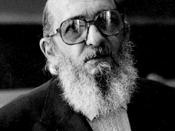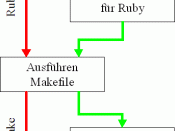"When we blindly adopt a religion, a political system, a literary dogma, we become automatons. We cease to grow." Stated by Anais Nin, this quote reflects the men of Ruby, Oklahoma, a town built on righteousness, fear and moral law. As the men of Ruby begin to sense change in their town, they "lay their pain, their terror and murderous rage (book cover)," upon a group of exiles seventeen miles outside of the town. These exiles, all women, live in the Convent, "a school where stilled Arapaho girls once sat (Morrison 4)". What goes wrong in Ruby though, cannot be blamed on the women of the Convent, rather it is the men's inability to recognize and cope with change.
The town of Ruby is founded on the basis of the past. Nine families (who are later defined as the eight-rock) escape the town of Haven because of the dust bowl occurrence.
During their escape from Haven and their journey to find a new town to live in, the families are not accepted anywhere. "Turned away by rich Choctaw and poor whites, chased by yard dogs, jeered at by camp prostitutes and their children, they were nevertheless unprepared for the aggressive discouragement they received from Negro towns already being built (13)". The nine families who are faced with this prejudice found the town of Ruby, a utopian society where nothing or no one can alter it.
The founding of the town incorporates the transportation of the Oven, a place where baptismal ceremonies are performed. The Oven symbolizes much more than that; it is what represents the town of Ruby. Piece by piece, brick by brick, the founding fathers of the town carried the Oven from Haven to Ruby. The Oven is so important to the men because it is...


